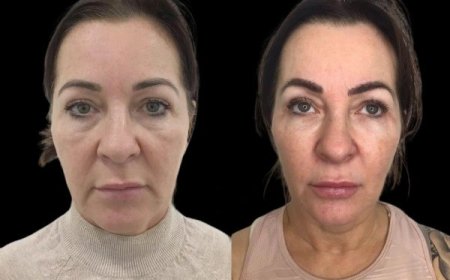How an Insomnia Specialist Can Help You Conquer Sleepless Nights
In this article, we’ll explore how insomnia specialists diagnose and treat sleep disorders, what to expect during your visit, and how they can help you break the cycle of sleeplessness.
Tired of lying awake for hours, staring at the ceiling while the rest of the world sleeps? If youve tried all the typical adviceavoiding caffeine, keeping a sleep diary, or limiting screen timewithout relief, you might need a deeper solution. Thats where an insomnia specialist comes in.
Insomnia isnt just frustrating; it can impact your mental clarity, mood, immune system, and long-term health. A qualified insomnia specialist offers expert guidance, personalized treatment, and scientifically proven methods to help you finally sleep soundly.
In this article, well explore how insomnia specialists diagnose and treat sleep disorders, what to expect during your visit, and how they can help you break the cycle of sleeplessness.
What Is an Insomnia Specialist?
An insomnia specialist is a medical professional trained in diagnosing and treating sleep disorders, particularly chronic insomnia. They often have backgrounds in sleep medicine, psychiatry, neurology, or psychology and are skilled in techniques like Cognitive Behavioral Therapy for Insomnia (CBT-I), pharmacological management, and sleep hygiene education.
Unlike general practitioners, insomnia specialists dig deeper into your specific sleep patterns, triggers, and lifestyle to uncover the root causes of your sleep issues.
Why See an Insomnia Specialist?
Sleep is essential to physical and mental well-being. Chronic insomnia can lead to serious consequences like:
-
Daytime fatigue and irritability
-
Depression or anxiety
-
Poor memory and concentration
-
Weakened immune system
-
High blood pressure and heart disease
While short-term insomnia might be manageable with lifestyle tweaks, chronic insomnia often requires expert help. Heres how a specialist can make a difference:
1. Precise Diagnosis
An insomnia specialist doesnt just treat symptomsthey identify what's causing your sleep issues. They assess physical health, mental health, habits, and environmental factors that contribute to poor sleep.
2. Customized Treatment Plans
Not all insomnia is the same. Some cases are due to anxiety, others to chronic pain, shift work, or even poor sleep habits developed over time. A specialist tailors treatments to address your unique challenges, offering far more than a one-size-fits-all approach.
3. Evidence-Based Therapies
The most effective treatment for chronic insomnia is Cognitive Behavioral Therapy for Insomnia (CBT-I). This non-drug, structured program helps retrain your brain for better sleep. Most insomnia specialists are certified to offer CBT-I or will refer you to a therapist who is.
4. Medication Management
When needed, a sleep specialist can prescribe or adjust medications for short-term relief or to support a broader behavioral therapy plan. Unlike over-the-counter sleep aids, these are carefully selected to avoid dependency or side effects.
What to Expect When Visiting an Insomnia Specialist
Step 1: Comprehensive Sleep Evaluation
Your first appointment typically includes a detailed consultation covering:
-
Your sleep history (when the problem started, how often it occurs)
-
Daily routines and sleep habits
-
Mental health and stress levels
-
Medical conditions or medications
You may be asked to keep a sleep diary or wear a sleep-tracking device to gather more data.
Step 2: Possible Sleep Studies
If your insomnia is linked to other disorders like sleep apnea or restless leg syndrome, the specialist may recommend a polysomnography (overnight sleep study) to gather in-depth insights.
Step 3: Diagnosis and Plan
Based on your evaluation, your specialist will identify the likely causes and recommend a treatment plan. This plan could include behavioral therapy, medication, sleep hygiene adjustments, or referral to other professionals (e.g., mental health providers).
Common Treatments Offered by Insomnia Specialists
1. Cognitive Behavioral Therapy for Insomnia (CBT-I)
CBT-I helps change the thoughts and behaviors that contribute to insomnia. It is a short-term, structured, and highly effective approach that often includes:
-
Sleep restriction: Limiting time in bed to increase sleep efficiency
-
Stimulus control: Breaking the association between bed and wakefulness
-
Cognitive restructuring: Challenging negative beliefs about sleep
-
Relaxation techniques: Deep breathing, meditation, or guided imagery
Studies show that CBT-I is more effective than sleeping pills for long-term relief.
2. Pharmacological Support
In some cases, your specialist may recommend short-term medications like:
-
Benzodiazepine receptor agonists (e.g., zolpidem)
-
Melatonin receptor agonists
-
Sedating antidepressants
-
Over-the-counter melatonin (in low, specific doses)
These are prescribed with caution and usually in combination with behavioral strategies.
3. Sleep Hygiene Coaching
Your specialist may work with you to fine-tune your environment and habits by:
-
Establishing consistent sleep and wake times
-
Reducing exposure to screens before bed
-
Managing light, temperature, and noise in the bedroom
-
Avoiding heavy meals, caffeine, and alcohol late in the day
Signs You Should See an Insomnia Specialist
Consider seeing a sleep specialist if:
-
Youve struggled with sleep for more than a month
-
Your sleep problems affect your daily life
-
You feel tired despite spending 78 hours in bed
-
You frequently rely on sleep aids without lasting results
-
You suspect another issue like anxiety, depression, or sleep apnea is involved
The earlier you seek help, the better the outcome.
How to Find the Right Insomnia Specialist
Here are some tips to help you locate a reputable provider:
1. Check Credentials
Look for board-certified specialists in sleep medicine through organizations like:
-
American Academy of Sleep Medicine (AASM)
-
American Board of Psychiatry and Neurology (ABPN)
-
American Board of Internal Medicine (ABIM)
2. Search Local Resources
Use keywords like insomnia specialist near me or CBT-I provider in [your city] on platforms like:
-
Healthgrades
-
Zocdoc
-
Psychology Today
-
Hospital websites
3. Ask Questions
-
Do they offer CBT-I?
-
Do they work with other specialists like psychologists or psychiatrists?
-
Do they provide telehealth options?
You Deserve Restful Sleep Get Help Today
Insomnia isnt just about sleepless nightsits about your health, focus, and quality of life. If youve tried everything without results, dont wait. A qualified insomnia specialist can provide the expert care you need to finally get back to sleeping deeply and waking up refreshed.







































